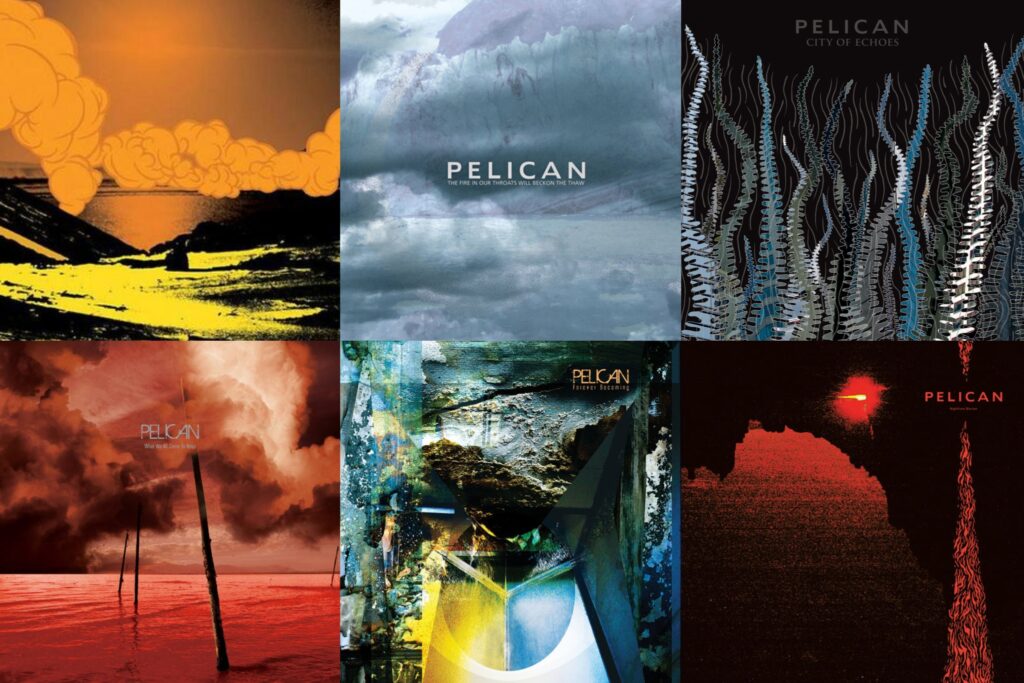
To begin with, Pelican is one of my favorite bands, not only in their genre, but also in general. I learnt about them through a greek article about the best albums released from Hydra Head Records and Australasia held a prominent place. Since then, I started listening to their music and I firmly became very attached to the band from Chicago.
The period when this relationship as a listener peaked was during quarantine, as well as the whole of 2021, which for me was a very difficult year on many levels. Pelican’s albums were always there for me, whether I needed something more melancholic or I needed something heavier to lift me up. In recent years, all the healing I did for myself was spent with the Americans being a constant choice in my playlists.
I have written comments on their Facebook page quite a few times explaining why I like their music so much and I have also tagged them in tribute articles like this one and it struck me that they always responded or commented on me. About a year ago I promised that I would do a Ranking of their albums or a tribute to their discography and that day is today.
The release of their new album Flickering Resonance gave me an opportunity to listen to each of their albums from the beginning and talk about the feelings each album evoked in me and how their style of music changed over time. I didn’t want to do a Ranking article, but I preferred to look at each album in detail through The Sound Vault’s new section new section where we analyze entire discographies of bands.
So let’s look at each of their releases in detail and write a few words about what to expect from their new album.
1. Australasia (2003)
I have written many times about this particular album and the fact that it made me fall in love with post-metal. Despite the issues they had during the recordings, the Americans entered the studio and the result is truly impressive. Long compositions with slow, low-tuned riffs, sludge elements, heavy outbursts and beautiful melodies in a 50-minute masterpiece.
One of their heaviest and rawest albums, Australasia brings out all their youthful momentum and heavy influences they had as a band, something that can also be seen in the Pelican EP, released in 2001. Its heaviest moments reminds you of the best albums of Neurosis, while its more melodic moments cope with some of the best post-rock music of the 00s. The introductory eleven-minute NightEndDay sets the tone for what you follow, while Drought captivates you with its climax at the end.
Australasia has beautiful flow and in the end lies my favourite track, which I consider one of the best post-metal songs ever written. It has excellent writing, it has passion, it has amazing riffs and it creates an explosion of emotions. Generally it is difficult for an instrumental album to leave you with such strong emotions. But this debut manages to do it.
2. The Fire in Our Throats Will Beckon the Thaw (2005)
It took me a long time to appreciate this album. The first few times I listened through Pelican’s discography, I didn’t give it the attention it deserved—and I’m not sure why. Many consider it their greatest creation, and it’s also their longest record. What becomes apparent from the very beginning is that in The Fire in Our Throats Will Beckon the Thaw, Pelican continue to build upon the legacy of Australasia.
The compositions become even longer (let’s not forget that the version of March to the Sea from their EP March into the Sea had a total duration of over 20 minutes), the riffs are even heavier, and their drawn-out intros pull you into a fantastic journey. Thematically, however, they delve into beautiful subjects concerning nature, the seasons of the year, the sea, and our planet, something that is evident in the incredible atmosphere their songs emit.
At the same time, the band begins to incorporate acoustic guitar, which greatly enhances how melodic and pleasant they sound. The Fire in Our Throats is a continuation of Australasia, as it retains many of its elements in songs like Last Day of Winter, but at the same time introduces many new aspects to the Americans’ music. As a result, tracks like Autumn into Summer, March to the Sea, and Sirius are classics of the entire post-metal and shoegaze genre.
3. City of Echoes (2007)
From the album focused on nature to the album that tackles the modern urban landscape. Pelican are growing, evolving, touring many cities, and naturally, this influences them when they return to the studio. As the band themselves state, traveling to different cities reveals the similarities found in urban life, and the album is influenced by global events at the time of the recordings.
The strangest aspect of City of Echoes, however, is that despite this thematic direction, instrumentally it is one of the most optimistic pieces of music in Pelican’s discography. From the opening tracks—Bliss In Concrete, City of Echoes, and Spaceship Broken – Parts Needed, the Americans sound lighter, they introduce more melodie, and their outros no longer feature the same heavy riffs as in their previous records.
The changes aren’t limited to the up-tempo style, but also stem from a realization the band had during their live performances: they didn’t have time to play many songs because most of them were over ten minutes long. So here, their songs are trimmed down to five to seven minutes, yet they lose nothing in terms of quality. In fact, this is the shortest, most compact, and at the same time the best album in their discography up to that point.
4. What We All Come to Need (2009)
This was Pelican’s first album with Southern Lord, after parting ways with Hydra Head, and their last album before Laurent Schroeder-Lebec’s departure in 2012—though he rejoined the band ten years later. It captures one of the darkest and most difficult periods in the band’s history, as Trevor de Brauw’s mother was ill and the band was exhausted from relentless touring. De Brauw himself has spoken extensively about how tough and grim that year was for them, and how they decided to scale back on live performances.
Nonetheless, What We All Come to Need is my personal favorite moment in the Americans’ discography. I first listened to it during a very dark period of my life and it matched perfectly with what I was going through. Since then, it has been a constant companion in my daily music routine. In this album, the more optimistic elements of City of Echoes are shaped into heavier songs.
The opening track Glimmer, along with Creeper and Strung Up from the Sky, are packed with riffs that blend the raw heaviness of their first two albums with the compositional style of City of Echoes—bridges and atmospheric outros abound in tracks that last between five and seven minutes. And what can I even say about Final Breath, which closes the album? Their first song to feature vocals by Allen Epley, seven of the most emotional and beautiful minutes of music I’ve ever heard.
Maybe it’s because this song—and this album in general—was tied to one of the strangest phases of my life, but it will always be there to remind me that those times are in the past. Now I can enjoy it just for the riffs, the melodies, and its amazing songwriting. A record that always fires me up at the beginning and always makes me feel emotional at the end.
5. Forever Becoming (2013)
A year before this album, Laurent Schroeder-Lebec, a founding member of the band, departed to dedicate more time to his family. With Dallas Thomas of The Swan King stepping in as his replacement, on Forever Becoming, Pelican continue to explore the darker side of their music in the style of What We All Come to Need, as well as Ataraxia/Taraxis, which was arguably the best EP they released prior to a new full length album.
This album beautifully showcases the clash of different songwriting approaches among the members of Pelican, and as a work, it seems even angrier, more explosive, and at times depressive. De Brauw has mentioned that he was initially working on 12–13-minute songs, which gradually evolved into tracks that run 5–8 minutes instead.
This approach is what makes Forever Becoming another fantastic addition to the Americans’ discography. Despite the departure of a talented guitarist and close friend, they found a way to write great music on tracks like Vestiges, Threnody, and Deny the Absolute, continuing to sweep us away on incredible musical journeys.
6. Nighttime Stories (2019)
I was really struck when I found out that Nighttime Stories was largely written through the exchange of musical ideas and riffs via Dropbox, mainly because the chemistry between the band and Thomas becomes even more apparent here. On this album, every member contributes their own touch and influence, making it yet another significant step in the band’s ongoing evolution.
Although it continues along the dark paths of its predecessors, musically it’s by far their heaviest album, at times even bordering on extreme metal. Larry Herweg delivers by far his best drumming performance, with highly dynamic, almost hardcore rhythms, while the rest of the band delves deep into a dark aesthetic—the guitar tones flirt with grindcore, and some transitions feel as though they were lifted straight out of a black metal record.
This is an album composed of relatively short tracks that range from six to eight minutes, but the emphasis lies in the heavy passages, the low-tuned riffs, and those chilling interludes that sometimes shift the entire mood of a song. Abyssal Pain and Cold Hope stand among their harshest material, and with the transitional It Stared at Me, we return to the feel of Forever Becoming. Arteries of Blacktop and Full Moon, Black Water form an outstanding duo, delivering one of the most beautiful closings in any Pelican album—thanks to melodies that alternate with explosive outbursts.
Possibly the most aggressive and furious version of Pelican, this record combines the raw intensity of their early days with the maturity they’ve developed over the years.
And now Flickering Resonance…
The return of Laurent Schroeder-Lebec to Pelican a few years ago filled me with joy, as I was eagerly awaiting to see what musical direction they would take and whether they’d try something completely new compared to their first four albums. I should also say that I’ve only listened to the singles from the album—Cascading Crescent, Indelible, Pining For Ever, and Gulch—a few times, since I always enjoy experiencing the album as a whole to understand the band’s overarching vision.
Combined with last year’s Adrift and Tending the Embers, it seems to me that Pelican are rediscovering the atmospheric quality and the grander, more optimistic riffs they had during the City of Echoes era. The new songs give off that same vibe, with some elements from What We All Come to Need and the extended track lengths and immersive atmosphere of The Fire in Our Throats.
I’m incredibly optimistic and, more importantly, very happy about this release. I can’t wait to listen to the album attentively, dig into the details, analyze it, and ultimately fall in love with it just like I did with their previous records. Pelican and their music have been there for me through many different phases of my life, and now that those times are behind me, I can fully embrace the melancholy and the journey that each of their albums build.
I really hope they come to Greece someday, because when they do, I’ll definitely put on my The Fire in Our Throats shirt and go see them live!

